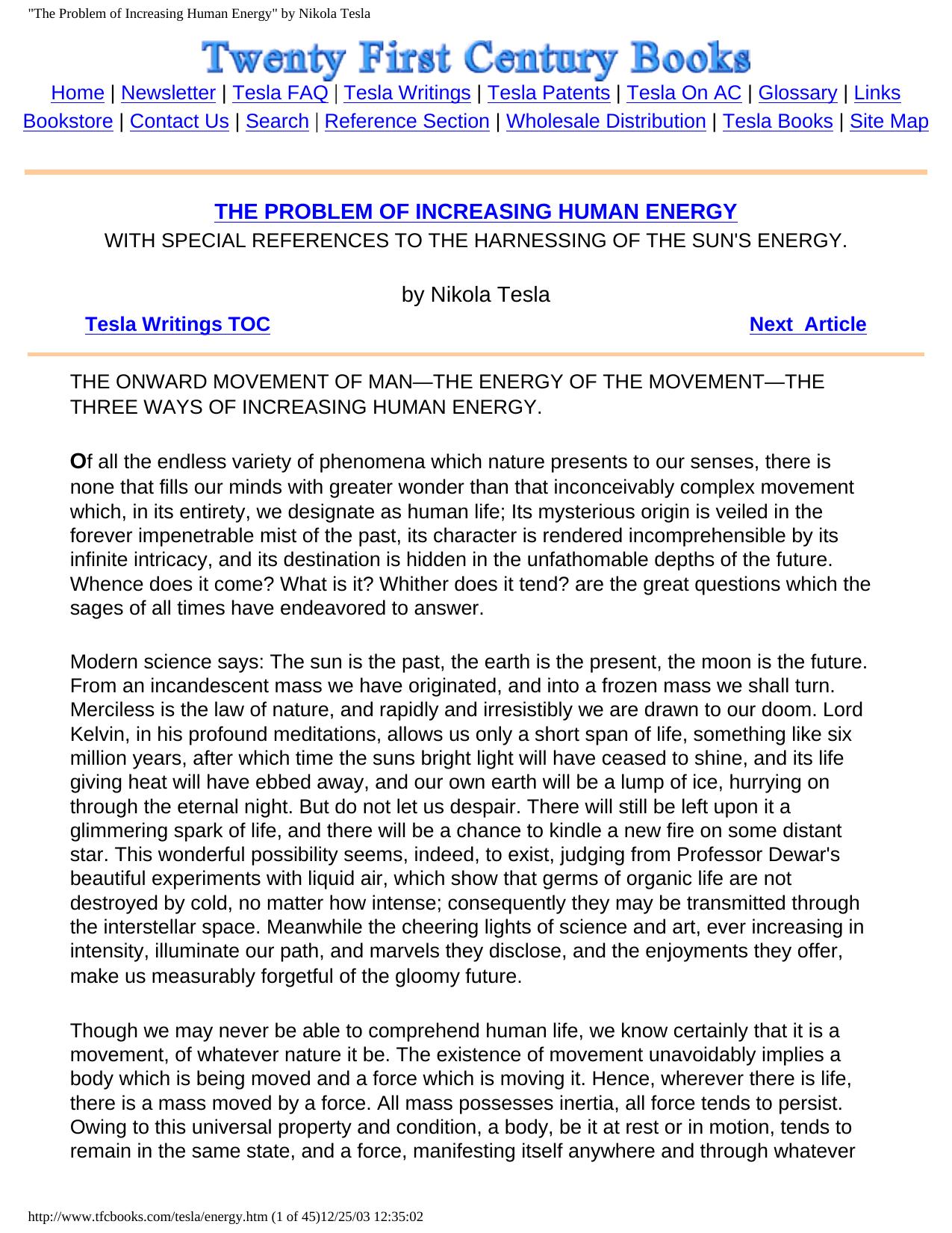The Problem of Increasing Human Energy by Nikola Tesla

Author:Nikola Tesla [Tesla, Nikola]
Language: eng
Format: mobi, pdf
Tags: Classics
Publisher: Neeland Media LLC
Published: 2013-12-31T16:00:00+00:00
EFFORTS TOWARD OBTAINING MORE ENERGY FROM COALâTHE ELECTRIC TRANSMISSIONâTHE GAS-ENGINEâTHE COLD-COAL BATTERY.
I remember that at one time I considered the production of electricity by burning coal in a battery as the greatest achievement toward the advancing civilization, and I am surprised to find how much the continuous study of these subjects has modified my views. It now seems to me that to burn coal, however efficiently, in a battery would be a mere makeshift, a phase in the evolution toward something much more perfect. After all, in generating electricity in this manner, we should be destroying material, and this would be a barbarous process. We ought to be able to obtain the energy we need without consumption of material. But I am far from underrating the value of such an efficient method of burning fuel. At the present time most motive power comes from coal, and, either directly or by its products, it adds vastly to human energy. Unfortunately, in all the process now adopted, the larger portion of the energy of the coal is uselessly dissipated. The best steam-engines utilize only a small part of the total energy. Even in gas-engines, in which, particularly of late, better results are obtainable, there is still a barbarous waste going on. In our electric-lighting systems we scarcely utilize one third of one per cent., and in lighting by gas a much smaller fraction, of the total energy of the coal. Considering the various uses of coal throughout the world, we certainly do not utilize more than two per cent. of its energy theoretically available. The man who should stop this senseless waste would be a great benefactor of humanity, though the solution he would offer could not be a permanent one, since it would ultimately lead to the exhaustion of the store of material. Efforts toward obtaining more energy from coal are now being made chiefly in two directionsâby generating electricity and by producing gas for motive-power purposes. In both of these lines notable success has already been achieved.
The advent of the alternating-current system of electric power-transmission marks an epoch in the economy of energy available to man from coal. Evidently all electrical energy obtained from a waterfall, saving so much fuel, is a net gain to mankind, which is all the more effective as it is secured with little expenditure of human effort, and as this most perfect of all known methods of deriving energy from the sun contributes in many ways to the advancement of civilization. But electricity enables us also to get from coal much more energy than was practicable in the old ways. Instead of transporting the coal to distant places of consumption, we burn it near the mine, develop electricity in the dynamos, and transmit the current to remote localities, thus effecting a considerable saving. Instead of driving the machinery in a factory in the old wasteful way of belts and shafting, we generate electricity by steam-power and operate electric motors. In this manner it is not
Download
The Problem of Increasing Human Energy by Nikola Tesla.pdf
This site does not store any files on its server. We only index and link to content provided by other sites. Please contact the content providers to delete copyright contents if any and email us, we'll remove relevant links or contents immediately.
The Art of Thinking Clearly by Rolf Dobelli(10458)
Mindhunter: Inside the FBI's Elite Serial Crime Unit by John E. Douglas & Mark Olshaker(9325)
Change Your Questions, Change Your Life by Marilee Adams(7762)
Nudge - Improving Decisions about Health, Wealth, and Happiness by Thaler Sunstein(7694)
Mastermind: How to Think Like Sherlock Holmes by Maria Konnikova(7325)
The Power of Now: A Guide to Spiritual Enlightenment by Eckhart Tolle(5761)
Men In Love by Nancy Friday(5234)
Altered Sensations by David Pantalony(5094)
Factfulness: Ten Reasons We're Wrong About the World – and Why Things Are Better Than You Think by Hans Rosling(4737)
The Confidence Code by Katty Kay(4251)
Thinking in Bets by Annie Duke(4218)
Man and His Symbols by Carl Gustav Jung(4131)
The Worm at the Core by Sheldon Solomon(3486)
Why Buddhism is True by Robert Wright(3447)
Liar's Poker by Michael Lewis(3442)
Three Women by Lisa Taddeo(3426)
The Inner Life of Animals by Peter Wohlleben(3313)
Descartes' Error by Antonio Damasio(3271)
How Music Works by David Byrne(3262)
